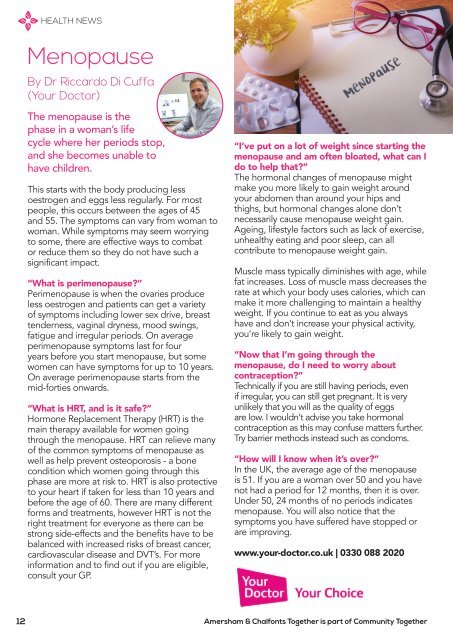Create successful ePaper yourself
Turn your PDF publications into a flip-book with our unique Google optimized e-Paper software.
HEALTH NEWS<br />
Menopause<br />
By Dr Riccardo Di Cuffa<br />
(Your Doctor)<br />
The menopause is the<br />
phase in a woman’s life<br />
cycle where her periods stop,<br />
and she becomes unable to<br />
have children.<br />
This starts with the body producing less<br />
oestrogen and eggs less regularly. For most<br />
people, this occurs between the ages of 45<br />
and 55. The symptoms can vary from woman to<br />
woman. While symptoms may seem worrying<br />
to some, there are effective ways to combat<br />
or reduce them so they do not have such a<br />
significant impact.<br />
“What is perimenopause?”<br />
Perimenopause is when the ovaries produce<br />
less oestrogen and patients can get a variety<br />
of symptoms including lower sex drive, breast<br />
tenderness, vaginal dryness, mood swings,<br />
fatigue and irregular periods. On average<br />
perimenopause symptoms last for four<br />
years before you start menopause, but some<br />
women can have symptoms for up to 10 years.<br />
On average perimenopause starts from the<br />
mid-forties onwards.<br />
“What is HRT, and is it safe?”<br />
Hormone Replacement Therapy (HRT) is the<br />
main therapy available for women going<br />
through the menopause. HRT can relieve many<br />
of the common symptoms of menopause as<br />
well as help prevent osteoporosis - a bone<br />
condition which women going through this<br />
phase are more at risk to. HRT is also protective<br />
to your heart if taken for less than 10 years and<br />
before the age of 60. There are many different<br />
forms and treatments, however HRT is not the<br />
right treatment for everyone as there can be<br />
strong side-effects and the benefits have to be<br />
balanced with increased risks of breast cancer,<br />
cardiovascular disease and DVT’s. For more<br />
information and to find out if you are eligible,<br />
consult your GP.<br />
“I’ve put on a lot of weight since starting the<br />
menopause and am often bloated, what can I<br />
do to help that?”<br />
The hormonal changes of menopause might<br />
make you more likely to gain weight around<br />
your abdomen than around your hips and<br />
thighs, but hormonal changes alone don’t<br />
necessarily cause menopause weight gain.<br />
Ageing, lifestyle factors such as lack of exercise,<br />
unhealthy eating and poor sleep, can all<br />
contribute to menopause weight gain.<br />
Muscle mass typically diminishes with age, while<br />
fat increases. Loss of muscle mass decreases the<br />
rate at which your body uses calories, which can<br />
make it more challenging to maintain a healthy<br />
weight. If you continue to eat as you always<br />
have and don’t increase your physical activity,<br />
you’re likely to gain weight.<br />
“Now that I’m going through the<br />
menopause, do I need to worry about<br />
contraception?”<br />
Technically if you are still having periods, even<br />
if irregular, you can still get pregnant. It is very<br />
unlikely that you will as the quality of eggs<br />
are low. I wouldn’t advise you take hormonal<br />
contraception as this may confuse matters further.<br />
Try barrier methods instead such as condoms.<br />
“How will I know when it’s over?”<br />
In the UK, the average age of the menopause<br />
is 51. If you are a woman over 50 and you have<br />
not had a period for 12 months, then it is over.<br />
Under 50, 24 months of no periods indicates<br />
menopause. You will also notice that the<br />
symptoms you have suffered have stopped or<br />
are improving.<br />
www.your-doctor.co.uk | 0330 088 <strong>2020</strong><br />
12<br />
<strong>Amersham</strong> & Chalfonts <strong>Together</strong> is part of Community <strong>Together</strong>















